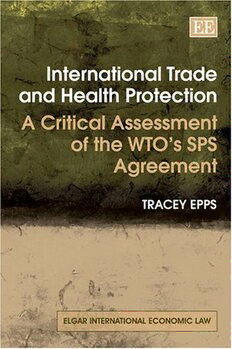
International trade and health protection: a critical assessment of the WTO ... PDF
364 Pages·2008·1.027 MB·English
Most books are stored in the elastic cloud where traffic is expensive. For this reason, we have a limit on daily download.
Preview International trade and health protection: a critical assessment of the WTO ...
Description:
This book examines and critiques the WTO's Agreement on the Application of Sanitary and Phytosanitary Measures (SPS Agreement), asking whether it strikes an appropriate balance between conflicting domestic health protection and trade liberalization objectives. It pays particular attention to situations likely to occur but not yet fully examined either in the literature or in WTO law; most importantly, where public opinion demands regulation in the face of scientific uncertainty as to the existence or otherwise of a health risk.Tracey Epps concludes that the SPS Agreement's science-based framework is capable of dealing with the differing objectives of health and trade, and that it provides countries with more flexibility to respond to scientific uncertainties and public sentiment than many critics contend. This conclusion is strongly influenced by a positive analysis of domestic regulatory decision-making, which finds potential for regulatory capture by domestic protectionist interests and thus emphasizes the importance of ensuring that decisions are made on a sound and principled basis. Including a historical overview of disputes over trade and health since the 1800s, this book provides a comprehensive analysis of and new perspective on an important area of intersection between international trade law and domestic policy.It will be of interest to a wide-ranging audience including legal and non-legal academics, policy makers and analysts in the field of risk regulation, trade law practitioners in governments, and lawyers and analysts in international institutions.
See more
The list of books you might like
Most books are stored in the elastic cloud where traffic is expensive. For this reason, we have a limit on daily download.
